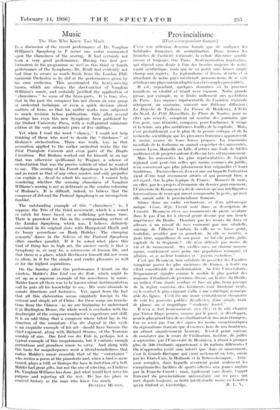Music The Man Who Knew Too Much
Ix a discussion of the recent performance of Dr. Vaughan Williams's Symphony in P minor one writer commented upon the clumsiness of the scoring. It had certainly not been 'a very good performance. Having two first per- formances in his programme as well as this third or fourth performance of the Symphony, Dr._ Boult had evidently not had time to secure as urinal 'finish from the London Phil- harthonic 'Orchestra .as he did at the performances given by his own orchestra. This accentuated the heavy-moving basses, which are always the sheet-anchor of Vaughan Williams's music; and certainly justified the application of " clumsiness " to some of the brass-parts. It is true, also, that in the past the composer has not shown an easy grasp of orchestral technique or even a quick decision about matters of form, so that his earlier works were subjected to much revision before publication. Only after several hearings has even this new Symphony been published by the Oxford University Press, with a well-printed miniature edition at the very moderate price of five shillings.
Yet when I read the word " clumsy," I could not help thinking of those who used to deride the " thickness " of Brahms's orchestration. There was truth, too, in that accusation applied to the earlier orchestral works like the First. Pianoforte Concerto and even parts of the Haydn Variations. But Brahms worked out for himself, in an age that was otherwise spellbound by Wagner, a scheme of orchestration that was the precise vehicle of what he wanted to say. The scoring of his Fourth. Symphony is as individual and as exact as that of any other master, and only prejudice can explain a -1..-Ausal to admit his mastery. I cannot help wondering whether the seeming clumsiness of Vaughan Williams's scoring is not as deliberate as the sombre colouring of Brahms's. It is difficult, indeed, to believe that the composer of Job and the Pastoral Symphony is an incompetent fumbler.
The outstanding example of this " clumsiness " is, I suppose, the Trio of the third movement, which is a round or catch for brass based on .a rollicking pot-house tune. There is precedent for this in the corresponding section of the London Symphony, which was, I believe, definitely associated in its original state with Hampstead Heath and its boozy accordions on Bank Holiday. The clumping peasants' dance in the Scherzo of the Pastoral Symphony offers another parallel. If it be asked what place this kind of thing has in high art, the answer surely is that a Symphony is, or may be, a microcosm of human life, and that there is a place, which Beethoven himself did not scorn . to allow, in it Tor the simpler and cruder pleasures as well as for the highest aspirations.
On the Sunday after this performance I heard, on the wireless, Mahler's Das Lied von der Erde, which might he set up as a supreme example of the non-chunsy in music. Mahler kneW all there was to be known about instrumentation and he puts all his-knowledge to use. His score abounds in minute directions and footnotes. Yet, apart from the fact that all this elaboration seems singularly foreign to the reticent and simple art of China—for these songs arc transla- tions from the Chinese—as we are beginning to understand it at Burlington House, the whole work is overladen with the deadweight of the composer-conductor's experience and skill. It is an odd thing that a composer whose talent lay in the direction of the miniature—Von der Jugend in this cycle is an exquisite example of his art—should have become the chief exponent, along with Richard Strauss, of the Teutonic worship of size. Das Lied von der Eide is, perhaps, not a typical example of this Megalomania, but it contains enough pretentious and grandiose music to serve. And along with this taste for magniloquence went a literal-mindedness that makes Mahler's music resemble that of the " entertainer " who recites a poem at the pianoforte and, when a bird is men- tioned, plays a trill, or thumps the bass in imitation of a bell. Mahler had great gifts, but not the one of selecting, is I believe Dr. Vaughan Williams has done. just what would best serve his purpose and rejecting all the rest. Ile has his place in musical history as the man who knew too much.
DYNELEY HussEv. .














































 Previous page
Previous page